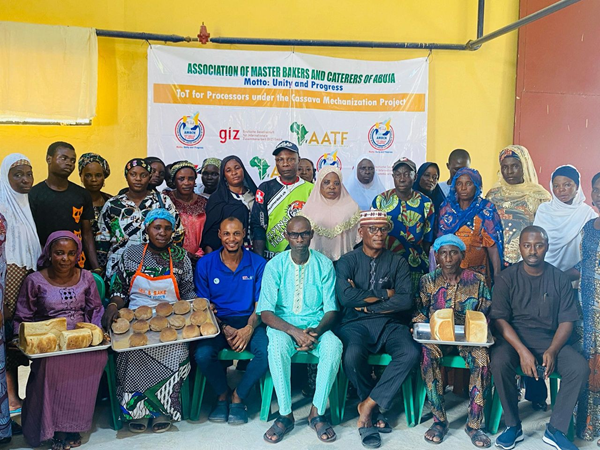
The second phase of a comprehensive training programme targeting cassava farmers and food processors recently took place in southwestern Nigeria, with 1,200 cassava farmers and 200 food processors trained across five locations in Oyo State – Iseyin, Ijaye, Oyo, Serafu and Soku.
Participants were equipped with practical knowledge on good agronomic practices (GAP), cassava value addition, farm mechanisation and the processing of high-quality cassava flour.
Organised under the Mechanisation of Cassava Production and Processing Project, the training is being implemented by the African Agricultural Technology Foundation (AATF) in partnership with the National Root Crops Research Institute (NRCRI). The initiative is funded by the German Federal Ministry for Economic Cooperation and Development through the Fund for the Promotion of Innovation in Agriculture (i4Ag).
According to the project coordinator, Mr. Taiwo Samuel Ogunleye, the programme’s goal extends beyond increasing cassava yields. It aims to drive value addition along the cassava value chain, moving beyond the production of traditional staples like gari and fufu. “This initiative is part of AATF’s broader commitment to enhancing the productivity and income potential of Nigeria’s cassava sector,” he said.
Director of tuber crops research at NRCRI Umudike and team lead for the initiative, Dr. Adeyemi Olojede reiterated the project’s long-term goal of empowering 6,000 cassava farmers and 1,000 food processors in the region over a three-year period. “This hands-on training is designed to improve cassava productivity and significantly enhance the livelihoods of farmers and processors,” he explained.
Olojede also stressed the importance of promoting the use of high-quality cassava flour (HQCF) as a strategy for income diversification among rural households. Experts from NRCRI, the Nigerian Stored Products Research Institute (NSPRI) in Ilorin and the Master Bakers Association in Abuja were deployed to facilitate the training and ensure participants received expert guidance.
A major highlight of the programme is its deliberate focus on empowering women and youth, especially in cassava processing. The 200 participating processors, most of whom were women from Oyo State, were trained on the economics and technical processes of HQCF production. The training opened up new income-generating opportunities and created pathways for improved household livelihoods.
Participants expressed their gratitude to the organisers, noting that the training has provided them with valuable skills in modern cassava farming and processing techniques. Many also expressed enthusiasm about the introduction of mechanisation and the prospects it holds for reducing labour and increasing efficiency.
This second phase builds on the inaugural training held in 2024, where over 800 farmers and processors received similar capacity development. The programme is expected to conclude in 2026, reaching its target of training 6,000 farmers and 1,000 processors – delivering on AATF’s commitment during the launch of the Cassava Mechanisation and Agro-Processing Facility in Fashola, Oyo State, in April 2024.
By bridging the knowledge and technology gap in cassava production and processing, the initiative is poised to make a significant contribution to national food security and the economic development of rural communities.


